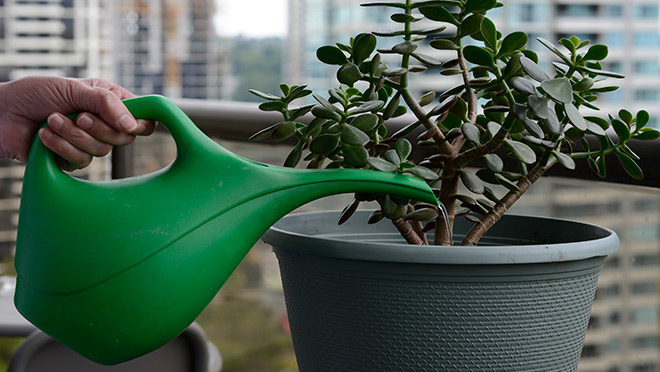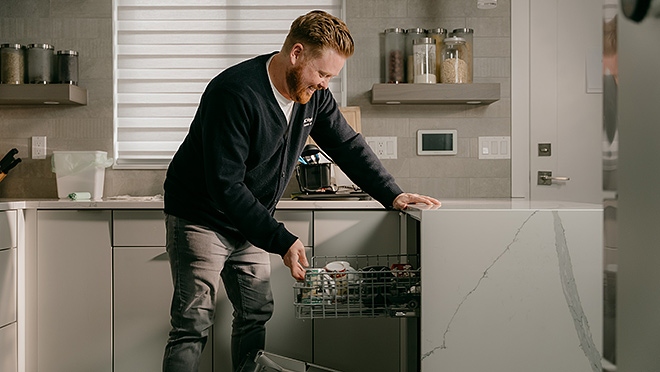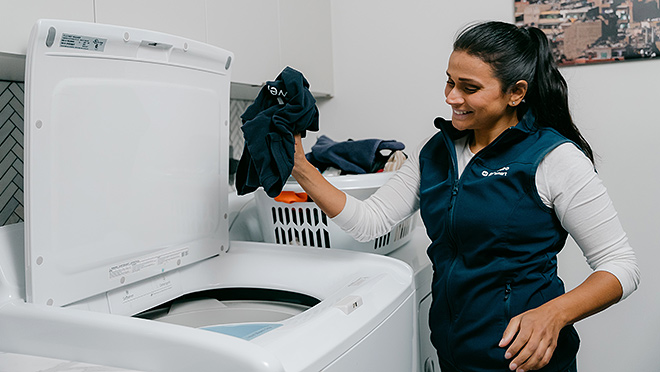In a super dry summer, ways we can help save water

Pay attention to water restrictions, and cut usage inside the home too
If you're already power smart, there's a good chance you're water smart too. Actions like taking shorter showers and running full loads of laundry and dishes save water and save on your energy bills.
But as drought and water restrictions hit most of B.C., what else can you do to use less water, and to use it wisely? Check our list of ideas below, and keep in mind that by mid-July, two-thirds of B.C.'s water basins were already ranked at drought level 4 or 5, the two highest levels on the scale.
"I am calling on everyone including businesses to follow water restrictions set by First Nations and local communities and to take steps to conserve water even above and beyond those restrictions," said Emergency Management and Climate Readiness Minister Bowinn Ma at a July 13 briefing at the B.C. River Forecast Centre.
Check your municipality's website for updates on water restrictions, and pay attention to them. The City of Vancouver, for example, limits manual lawn watering at residences to Saturdays (even-numbered addresses) and Sundays (odd-numbered addresses), and only from 6 a.m. to 9 a.m.
Let that lawn go brown, or rewild your yard
A brown lawn is not a dead lawn, so consider letting your lawn go. A 2005 NASA-led study found that in most U.S. regions, up to 75% of a home's total water usage is for lawn irrigation.
If you want to learn which grasses fare better in drought in others, check out this Better Homes & Gardens story about brown lawns. And closer to home, see the before and after photos a B.C. resident posted in a 2022 letter to the editor in the Aldergrove Star about how quickly his browning lawn bounced back.
Looking to the long term, consider turning your lawn into a meadow full of drought-resistant native plants. A cbc.ca story in May looked at the increase in "meadow-making" in Vancouver Island's Capital Region District.
Water plants strategically, early in the morning
Water gardens slowly, in the morning, by hand, near the roots. Break up hardened dirt to allow water to soak in, and consider adding mulch to your gardens, as it shades soil and helps conserve soil moisture.
Metro Vancouver's Growgreen Guide is a fantastic online resource for designing gardens and lawns in the Lower Mainland. Use the website's PickAPlant search tool, to filter by plant type, sun exposure, plant height, and bloom colour.

Stop handwashing dishes
According to a German study at the University of Bonn, a full dishwasher load can wash 144 items with 13 litres of water, while hand washing those same items uses 100 litres on average. So if you have a dishwasher, use it, and select the eco mode, even if it takes longer. Resist rinsing your dishes before putting them in the dishwasher. Just scrape food scraps off dishes (a silicon spatula works best) before putting them in the dishwasher, and arrange your dishes so that few, if any, touch. That will ensure the washer's jets properly clean all your dishes.
Buying a new dishwasher? Browse for energy-efficient options at our online Power Smart Shop.
Install low-flow showerheads
Low-flow, energy-efficient showerheads will help cut down on the amount of water you use, without sacrificing water pressure or your shower time. You can get a low-flow showerhead for as little as $15 or less, and the energy savings in hot water will pay that off fairly quickly.
To start with, check to see that a manufacturer's eco promise rings true. Unless the showerhead uses less water than the typical 2.5 gallons per minute (gpm) – ideally 1.75 gpm or less – it's not really delivering. Take the time to check the gpm number and recognize that not all websites deliver that data. You may have to input that model number into a website that does.
Get a rain barrel
It's a little late to do it this summer, but consider adding a rain barrel to your yard to grab the freely available rain for when you need it. Several B.C. municipalities offer rebates each spring for the purchase of rain barrels but act fast on those offers – they’re increasingly popular. You can get rain barrels, starting at about $120, at larger home and garden shops in B.C.
Install faucet aerators
Low-flow faucet aerators help you cut down on water use, which will cut down on your electricity costs. Installing a high-efficiency aerator on your kitchen sink could save you $28 per year in hot water costs.

Get your teenagers to do their own laundry
If you have a teenager with a messy room, there's a good chance a lot of clothes are getting washed when they're not even dirty. That top that wasn't right for that day likely got tossed on the floor, or those just-washed clothes just collected in a pile rather than being put away. Making your teen wash their own clothes can cut down on the amount they wash, as they'll suddenly discover how time-consuming laundry can be. Just make sure to make full loads in cold water the rule in your household, and introduce them to the wonders of hang-drying to help their favourite clothes last longer.
Flush your toilet less
According to the City of Vancouver, the biggest water use in your home is from flushing your toilet, at an average of 24%, followed by showers at 20%. Try to avoid flushing when you don't have to – and consider employing the cottage life mantra: 'If it's yellow, let it mellow'.
Like the Accidental Tourist, do laundry at your feet
Way back in 1988, William Hurt starred in the movie adaptation of Ann Tyler's novel The Accidental Tourist. Among his quirks, the movie's protagonist (Hurt) would wash his clothes by sloshing them around in the bathtub while he showers.
While we don't recommend this as a go-to, you could wash an item or two at your feet when you don't want to wait until you have enough clothes for a full load. If you happen to have a kid at a summer camp who needs to wear their camp tee each day, consider letting them have a go at washing their own shirt.